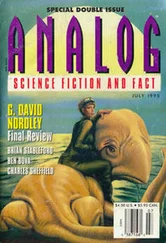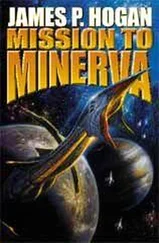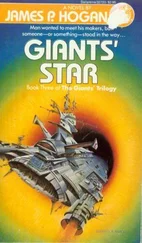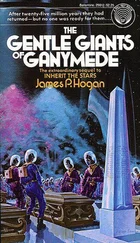James Hogan - Inherit the Stars
Здесь есть возможность читать онлайн «James Hogan - Inherit the Stars» весь текст электронной книги совершенно бесплатно (целиком полную версию без сокращений). В некоторых случаях можно слушать аудио, скачать через торрент в формате fb2 и присутствует краткое содержание. Жанр: Фантастика и фэнтези, на английском языке. Описание произведения, (предисловие) а так же отзывы посетителей доступны на портале библиотеки ЛибКат.
- Название:Inherit the Stars
- Автор:
- Жанр:
- Год:неизвестен
- ISBN:нет данных
- Рейтинг книги:3 / 5. Голосов: 1
-
Избранное:Добавить в избранное
- Отзывы:
-
Ваша оценка:
- 60
- 1
- 2
- 3
- 4
- 5
Inherit the Stars: краткое содержание, описание и аннотация
Предлагаем к чтению аннотацию, описание, краткое содержание или предисловие (зависит от того, что написал сам автор книги «Inherit the Stars»). Если вы не нашли необходимую информацию о книге — напишите в комментариях, мы постараемся отыскать её.
Inherit the Stars — читать онлайн бесплатно полную книгу (весь текст) целиком
Ниже представлен текст книги, разбитый по страницам. Система сохранения места последней прочитанной страницы, позволяет с удобством читать онлайн бесплатно книгу «Inherit the Stars», без необходимости каждый раз заново искать на чём Вы остановились. Поставьте закладку, и сможете в любой момент перейти на страницу, на которой закончили чтение.
Интервал:
Закладка:
For once, everything added up. About twenty-five million years ago, the concentration of carbon dioxide in the atmosphere of Minerva apparently increased suddenly, possibly through some natural cause that had liberated the gas from chemical combination in rocks, or possibly as a result of something the Ganymeans had done. This could also explain why the Ganymeans had brought in all the animals. Perhaps their prime objective had been to redress the balance by covering the planet with carbon-dioxide-absorbing, oxygen-producing terrestrial green plants; the animals had been included simply to preserve a balanced ecology in which the plants could survive. The attempt failed. The native life succumbed, and the more highly resistant immigrants flourished and spread out over a whole new world denuded of alien competition. Nobody knew for sure that it had been so on Minerva. Possibly nobody ever would.
And nobody knew what had become of the Ganymeans. Perhaps they had perished along with their cousins. Perhaps, when their efforts proved futile, they had abandoned Minerva to its new inhabitants and left the Solar System completely to find a new home elsewhere. Hunt hoped so. For some strange reason he had developed an inexplicable affection for this mysterious race. In one of the Lunarian texts he had come across a verse that began: "Far away among the stars, where the Giants of old now live…" He hoped it was true.
And so, quite suddenly, at least one chapter in the early history of Minerva had been cleared up. Everything now pointed to the Lunarians and their civilization as having developed on Minerva and not on Earth. It explained the failure of Schorn’s early attempt to fix the length of the day in Hunt’s calendar by calculating Charlie’s natural periods of sleep and wakefulness. The ancestors of the Lunarians had arrived from Earth carrying a deeply rooted metabolic rhythm evolved around a twenty-four-hour cycle. During the twenty-five million years that followed, some of the more flexible biological processes in their descendants adapted successfully to the thirty-five-hour day of Minerva, while others changed only partially. By Charlie’s time, all the Lunarians’ physiological clocks had gotten hopelessly out of synchronization; no wonder Schorn’s results made no sense. But the puzzling numbers in Charlie’s notebook still remained to be accounted for.
In Houston, Caldwell read Hunt and Danchekker’s joint report with deep satisfaction. He had realized long before that to achieve results, the abilities of the two scientists would have to be combined and focused on the problem at hand instead of being dissipated fruitlessly in the friction of personal incompatibility. How could he manipulate into being a situation in which the things they had in common outweighed their differences? Well, what did they have in common? Starting with the simplest and most obvious thing-they were both human beings from planet Earth. So where would this fundamental truth come to totally overshadow anything else? Where but on the barren wastes of the Moon or a hundred million miles out in the emptiness of space? Everything seemed to be working out better than he had dared hope.
"It’s like I always said," Lyn Garland stated coyly when Hunt’s assistant showed her a copy of the report. "Gregg’s a genius with people."
The arrival in Ganymede orbit of the seven ships from Earth was a big moment for the Jupiter Four veterans, especially those whose tour of duty was approaching an end and who could now look forward to going home soon. In the weeks to come, as the complex program of maneuvering supplies and equipment between the ships and the surface installations unfolded, the scene above Ganymede would become as chaotic as that above Luna had been during departure preparations. The two command ships would remain standing off ten miles apart for the next two months. Then Jupiter Four, accompanied by two of the recently arrived freighters, would move out to take up station over Callisto and begin expanding the pilot base already set up there. Jupiter Five would remain at Ganymede until joined by Saturn Two, which was at that time undergoing final countdown for Lunar lift-out and due to arrive in five months. After rendezvous above Ganymede, one of the two ships (exactly which was yet to be decided) would set course for the ringed planet, on the farthest large-scale manned probe yet attempted.
The long-haul sailing days of Jupiter Four were over. Too slow by the standards of the latest designs, it would probably be stripped down to become a permanent orbiting base over Callisto. After a few years it would suffer the ignoble end of being dismantled and cannibalized for surface constructions.
With all the hustle and traffic congestion that erupted in the skies over Ganymede, it was three days before the time came for the group of UNSA scientists to be ferried to the surface. After months of getting used to the pattern of life and the company aboard the ship, Hunt felt a twinge of nostalgia as he packed his belongings in his cabin and stood in line waiting to board the Vega moored alongside in the cavernous midships docking bay. It was probably the last he would see of the inside of this immense city of metal alloys; when he returned to Earth, it would be aboard one of the small, fast cruisers ferried out with the mission.
An hour later Jupiter Five, festooned in a web of astronautic engineering, was shrinking rapidly on the cabin display in the Vega. Then the picture changed suddenly and the sinister frosty countenance of Ganymede came swelling up toward them.
Hunt sat on the edge of his bunk inside a Spartan room in number-three barrack block of Ganymede Main Base and methodically transferred the contents of his kit bag into the aluminum locker beside him. The air-extractor grill above the door was noisy. The air drawn in through the vents set into the lower walls was warm, and tainted with the smell of engine oil. The steel floor plates vibrated to the hum of heavy machinery somewhere below. Propped up against a pillow on the bunk opposite, Danchekker was browsing through a folder full of facsimiled notes and color illustrations and chattering excitedly like a schoolboy on Christmas Eve.
"Just think of it, Vic, another day and we’ll be there. Animals that actually walked the Earth twenty-five million years ago! Any biologist would give his right arm for an experience like this." He held up the folder. "Look at that. I do believe it to be a perfectly preserved example of Trilophodon-a four-tusked Miocene mammoth over fifteen feet high. Can you imagine anything more exciting than that?"
Hunt scowled sourly across the room at the collection of pin-ups adorning the far wall, bequeathed by an earlier UNSA occupant.
"Frankly, yes," he muttered. "But equipped rather differently than a bloody Trilophodon."
"Eh? What’s that you said?" Danchekker blinked uncomprehendingly through his spectacles.
Hunt reached for his cigarette case. "It doesn’t matter, Chris," he sighed.
Chapter Twenty-Two
The flight northward to Pithead lasted just under two hours. On arrival, the group from Earth assembled in the officers’ mess of the control building for coffee, during which scientists from Jupiter Four updated them on Ganymean matters.
The Ganymean ship had almost certainly been destined for a large-scale, long-range voyage and not for anything like a limited exploratory expedition. Several hundred Ganymeans had died with their ship. The quantity and variety of stores, materials, equipment, and livestock that they had taken with them indicated that wherever they had been bound, they had meant to stay.
Everything about the ship, especially its instrumentation and control systems, revealed a very advanced stage of scientific knowledge. Most of the electronics were still a mystery, and some of the special-purpose components were unlike anything the UNSA engineers had ever seen. Ganymean computers were built using a mass-integration technology in which millions of components were diffused, layer upon layer, into a single monolithic silicon block. The heat dissipated inside was removed by electronic cooling networks interwoven with the functional circuitry. In some examples, believed to form parts of the navigation system, component packing densities approached that of the human brain. A physicist held up a slab of what appeared to be silicon, about the size of a large dictionary; in terms of raw processing power, he claimed, it was capable of outperforming all the computers in the Navcomms Headquarters building put together.
Читать дальшеИнтервал:
Закладка:
Похожие книги на «Inherit the Stars»
Представляем Вашему вниманию похожие книги на «Inherit the Stars» списком для выбора. Мы отобрали схожую по названию и смыслу литературу в надежде предоставить читателям больше вариантов отыскать новые, интересные, ещё непрочитанные произведения.
Обсуждение, отзывы о книге «Inherit the Stars» и просто собственные мнения читателей. Оставьте ваши комментарии, напишите, что Вы думаете о произведении, его смысле или главных героях. Укажите что конкретно понравилось, а что нет, и почему Вы так считаете.


![Лаура Бренз - Потомственная ведьма[Inherit the Witch]](/books/79609/laura-brenz-potomstvennaya-vedma-inherit-the-witch-thumb.webp)








